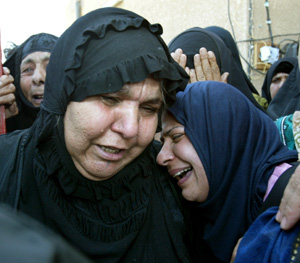|
Bush Foreign Policy Stalls
|
 |
|
Iraqis mourn the death of two family members, Zamil Jemeel and his wife Amel Dhary, who were mistakenly killed by U.S. soldiers at a roadblock on Sept. 27 in Zedan, Iraq. |
Just five months ago President Bush glowed in triumph. Now at every turn, he faces opposition to his aggressive foreign policy and its skyrocketing costs.
The occupations of Iraq and Afghanistan have become prolonged bloody conflicts reminiscent of Vietnam. The president admits that his "road map" to peace in the Middle East is a shambles. China, the key broker of negotiations between the U.S. and North Korea, claims that the White House is the main obstacle to resolving the dangerous nuclear standoff.
The U.N. flatly refused recent U.S. proposals on Iraq. And the developing countries denounced unfair U.S. trade policies and walked out of the recent World Trade Organization meeting in Cancún.
According to a Sept. 17 Defense Department intelligence report, the U.S.'s main foe in Iraq may be ordinary Iraqis who are increasingly hostile to the occupation, not terrorists or Saddam Hussein. A recent Gallup poll in Baghdad showed that President Jacques Chirac of France, who strongly opposed the Iraq war and occupation, is much more popular than President Bush.
Even leading members of the Iraqi Governing Council, handpicked by the U.S., openly criticize U.S. dominance and refer to U.S. administrator L. Paul Bremer as a "king" who "treats them as his subjects."
Contrary to White House assurances before the war, the costs of the occupations of Iraq and Afghanistan are staggering--with no end in sight. The president has requested $87 billion on top of the $79 billion already spent. Many experts claim this is a serious danger to a sputtering economy that has shed three million jobs since Bush took office. And it is salt in the wounds of those suffering from cuts in spending for jobs, education, health and other social services.
The $166 billion bill for the occupations of Iraq and Afghanistan so far is the largest U.S. emergency expenditure since World War II. The Center for American Progress says the new $87 billion request alone is more than 10 times the budget for the Environmental Protection Agency and nearly triple what Bush requested for kindergarten through 12th grade education in 2004.
The failures of U.S. policy in Iraq have given rise to a raging debate over the occupation. Jeffrey Sachs, a famed Columbia University economist, argued on Sept. 10: "There is certainly no sure course to achieving Iraqi stability, much less democracy, but that is no reason for a continued U.S. occupation. The longer the U.S. stays, the longer will be the agony in Iraq...America's continued occupation will delay real solutions, not create them, and at a massive cost in dollars and lives."
With no weapons of mass destruction found, polls show support for the president is dwindling. Becky Bunting of Omaha has two brothers in the Navy and was a big supporter of the invasion of Iraq. "But I don't see a winning situation here for anybody," she told The New York Times on Sept. 14.
In Iraq, water, electricity, security and jobs are still scarce. Dr. Faiq Amin Bakr, director of the Baghdad Central Morgue, reels off the grim statistics: 462 people dead under suspicious circumstances in May, some 70 percent from gunshot wounds; 626 in June; 751 in July; 872 in August.
International scholars estimate that the U.S. has killed at least 7,352 Iraqi civilians and wounded 20,000 more. The U.S. also holds more than 10,000 Iraqi prisoners.
"The American soldiers are so panicky that if a tire bursts in the street, they start shooting," said Nabil Saleh Al-ani, a cousin of one of the victims. "I know they hate my guts, but they can't say so because I've got a gun," a U.S. soldier related.
As of Sept. 27, 307 U.S. soldiers have been killed. Another 6,000 have been evacuated from Iraq for medical reasons, including more than 1,500 who have been wounded, many seriously, according to The Washington Post.
The only clear winners in Iraq are U.S. corporations like Vice President Cheney's Halliburton and Bechtel. They are making millions from the war and stand to benefit even more from the new policy of opening Iraq to foreign investment.
Waleed and Hani Hafidh vented the rage of many Iraqi businessmen, telling The Los Angeles Times that the new policy will destroy Iraq's private sector, create a permanent "world occupation" of its economy and render the Iraqi people "immigrants in their own land."
Hayder Awad Aabadi, a leading member of the U.S.-appointed Iraqi Governing Council, asserts, "Iraqis are a very proud people. They will not be motivated in a situation where things are run by a foreign occupying power."
Bob Wing is managing editor of War Times.
| Month in Review |
|---|
|
August 2010: |
| PAST articles |
Detoit: I Do Mind Empire (USSF Recap) “Bring the War (English) Time for Rebirth: (English) War Weariness, Military Heft, and (English) The Global Military Industrial Complex (English) A Stalled (English) Bush's Iraq “Surge”: Mission Accomplished? Iran: Let's Start with Some Facts Nuclear Weapons Forever (English) Time to End the Occupation of Iraq First-Hand Report from the Middle East (English) Haditha is Arabic (English) A Movement to End Militarism From Soldier to Students Not Soldiers Israel's "Disengagement" U.S. Soldiers Torture: Help Stop Torture — Be All You Can Be: OCTOBER 2006
|
|
War Times/Tiempo de Guerras is a fiscally sponsored project of the |